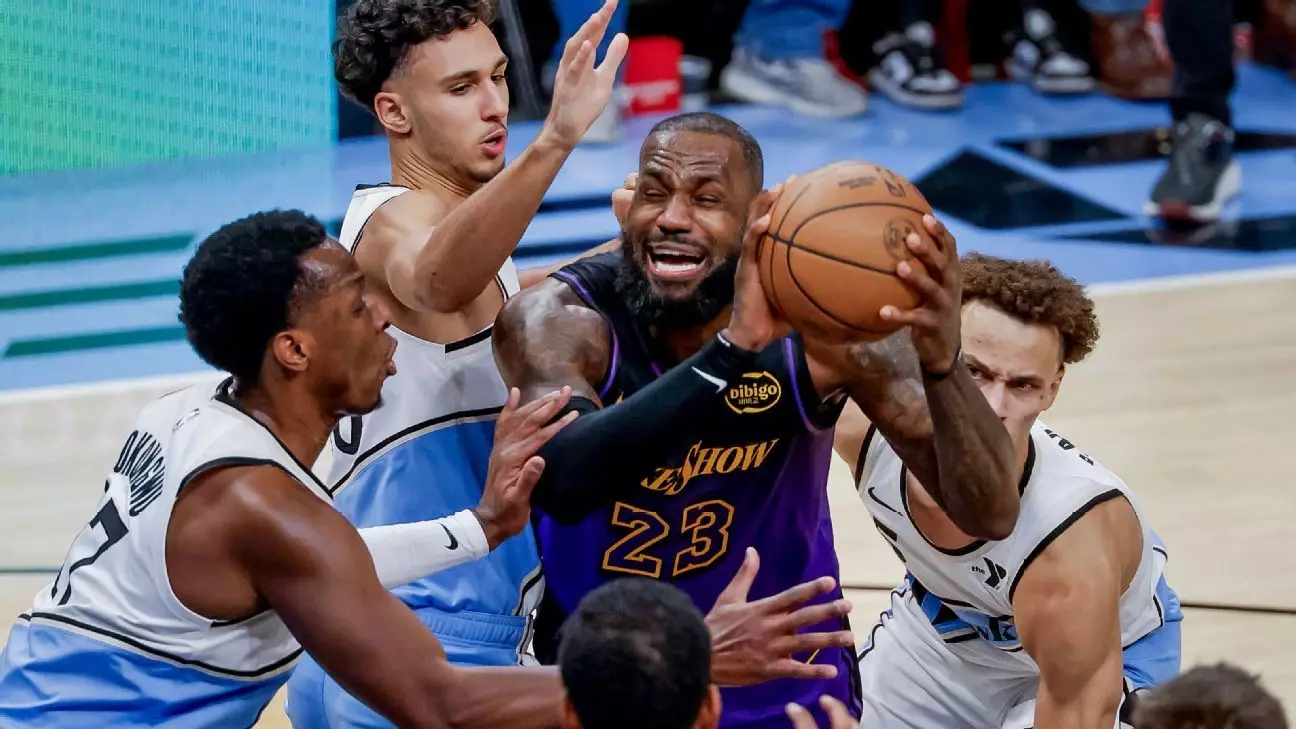The Los Angeles Lakers faced yet another crushing defeat in their daunting four-game road trip, culminating in a nail-biting overtime loss to the Atlanta Hawks, 134-132. The game showcased the team’s ongoing struggles as they fell further into the depths of a challenging season, marking their seventh loss in the past nine matches. While superstars LeBron James and Anthony Davis had standout performances, their contributions were overshadowed by critical late-game errors, revealing a deeper, systemic issue with the team’s roster and overall strategy.
In the wake of several injuries to key players, the Lakers have found themselves in a precarious situation. LeBron James highlighted the significant lack of depth when he lamented the absence of critical bench players. Austin Reaves, Jarred Vanderbilt, Christian Wood, and Jaxson Hayes are all sidelined, and their collective absence has dramatically impacted the team’s performance. The Lakers’ bench was decisively outscored 65-17 by the Hawks, underscoring a stark disparity that has plagued the team throughout the season.
Without Reaves, known for his ability to connect plays while providing productive scoring, the Lakers have struggled to maintain offensive fluidity. Coach JJ Redick emphasized Reaves’ role as both a scorer and a playmaker, describing him as the “connector” for the team. His day-to-day status indicates a continuous recovery process that poses uncertainty for the Lakers moving forward. Given that Hayes and Wood are expected to be unavailable for an extended period, team cohesion and consistency in performance remain under threat.
Adjusting to the absence of core players has forced Redick to experiment with lineups, including surprising moves such as starting Gabe Vincent over D’Angelo Russell. These tactical shifts are seen as attempts to find a semblance of stability in a tumultuous season. It’s clear that the Lakers are grappling with the need to build chemistry among players who have seen limited court time alongside one another. LeBron’s acknowledgment of the “mismatching with lineups” highlights the difficulty in creating a cohesive strategy when so many pieces are missing.
Both James and Davis have provided stellar individual performances—James tallied 39 points with a triple-double, while Davis contributed 38 points and numerous rebounds. Yet, their Herculean efforts were dampened by lapses in focus and execution, further emphasizing the extensive burden placed on them to deliver without a fully functional supporting cast. Davis’ admission that “there’s no cavalry” reflects the reality that outside support is not emerging, and the Lakers must forge ahead with their current resources.
Despite the brilliant individual exhibits from their star players, the question remains: can the Lakers rise to the occasion when their supporting structure is failing? The pair of veterans has demonstrated their capability to take control on the court; however, this constant reliance on two players could lead to potential burnout as the season progresses. Rather than fostering reliance on a couple of talents—James and Davis—the Lakers must find alternative scoring options and contributions from their bench, which has seen them fail to finish games triumphantly.
This growing dissatisfaction is reflected in James’ statement regarding the team’s need “to not drown.” The urgency and pressure to reverse the current losing trend are palpable. Moving forward, the challenge for the Lakers will be to harness their talent while developing strategies that enable bench players to thrive—even in the absence of key contributors. Creating a culture where the entire roster feels empowered to contribute could be crucial in building resilience against future adversities.
The Lakers face a pressing need to regroup as they prepare for their next matchup, a home game against the Portland Trail Blazers. The season’s grueling nature has sparked discussions not just of victories and losses, but of the broader implications on team morale, performance consistency, and long-term strategy. For the Lakers, there’s no simple resolution; success will stem from ongoing adjustments, maintaining focus, and elevating the contributions of every player stepping onto the court.
Ultimately, the current state of the Lakers reflects both the brilliance and fragility of a superstar-driven lineup. With the looming threat of injuries and underperformance, the emphasis must rest on cultivating a cohesive team effort rather than relying solely on the stars. As they push to return to winning ways, embracing teamwork will be paramount to ensuring the Lakers become a formidable force in the league once again.


Leave a Reply